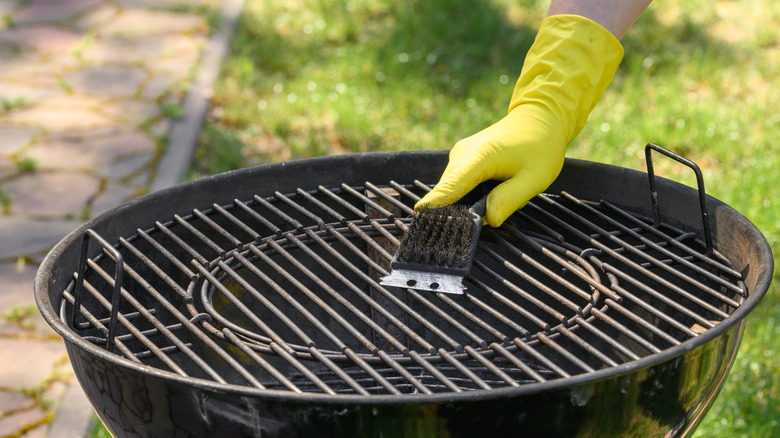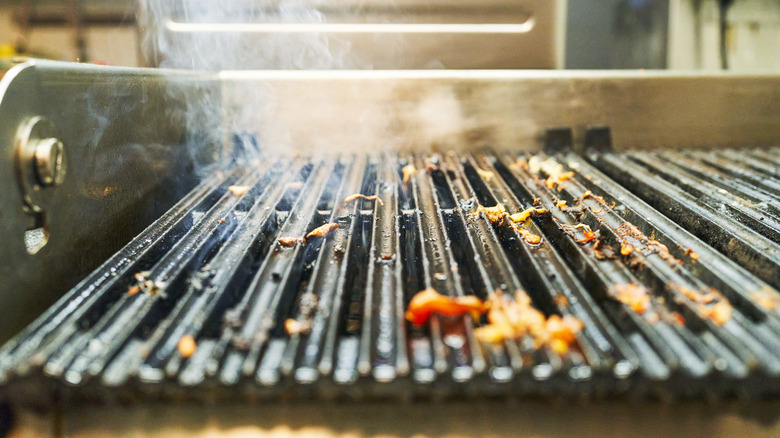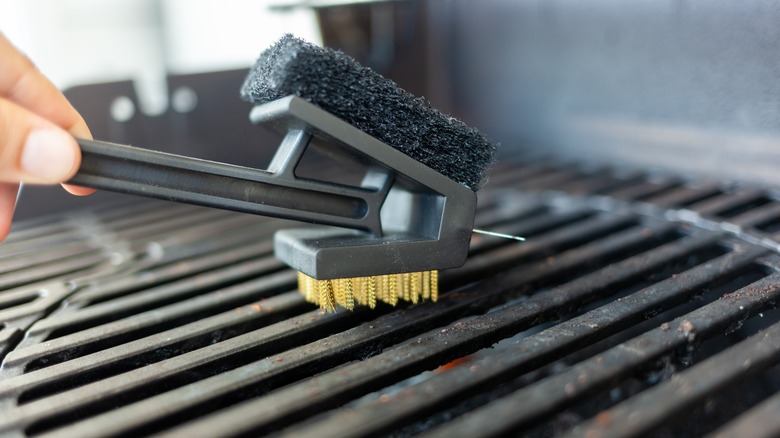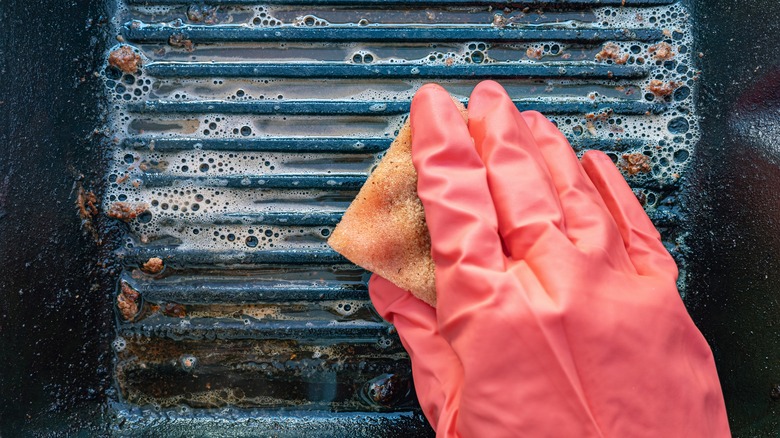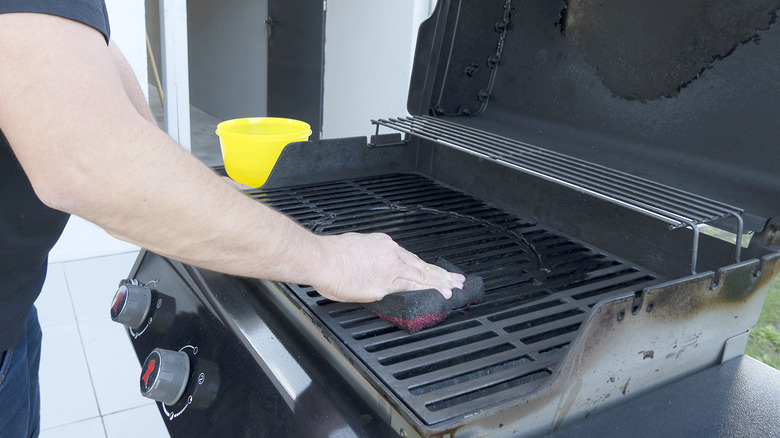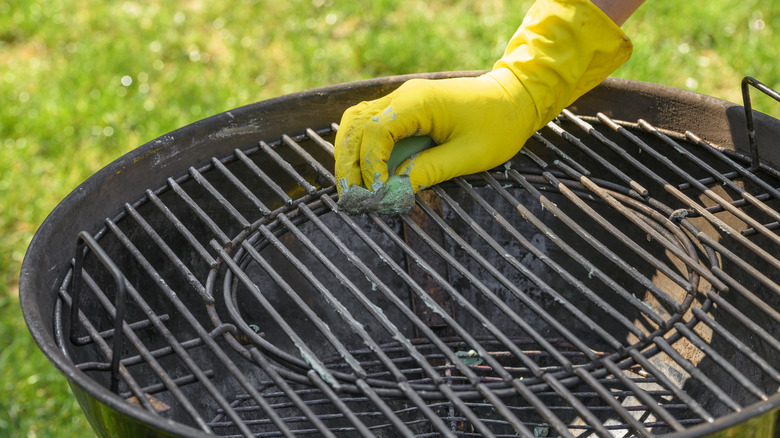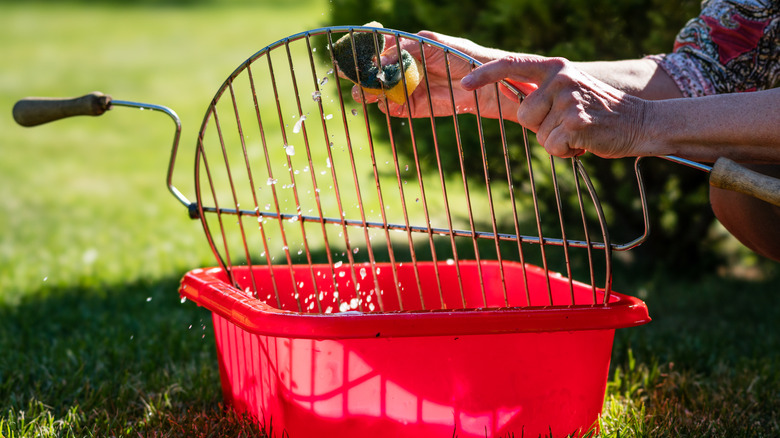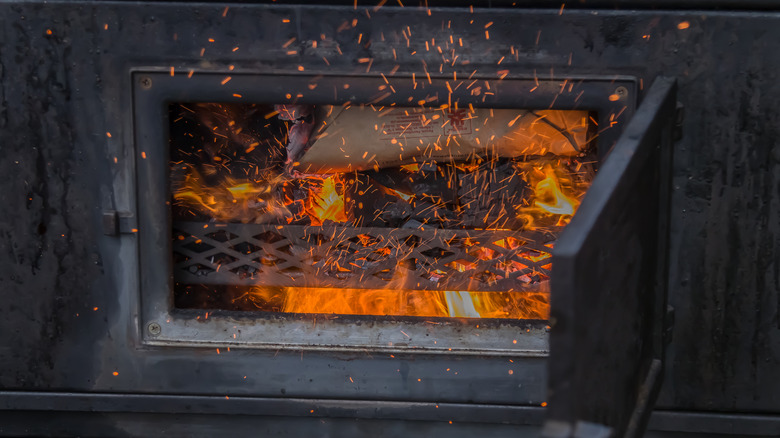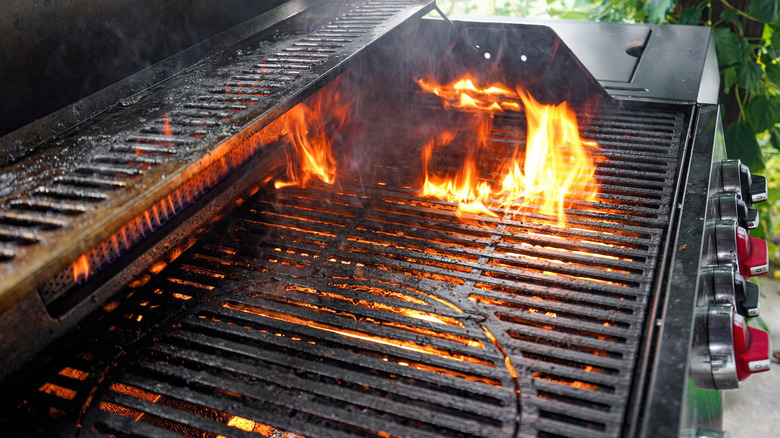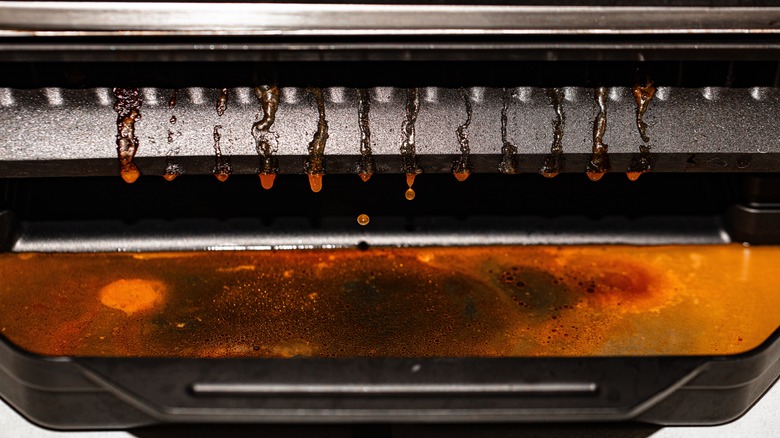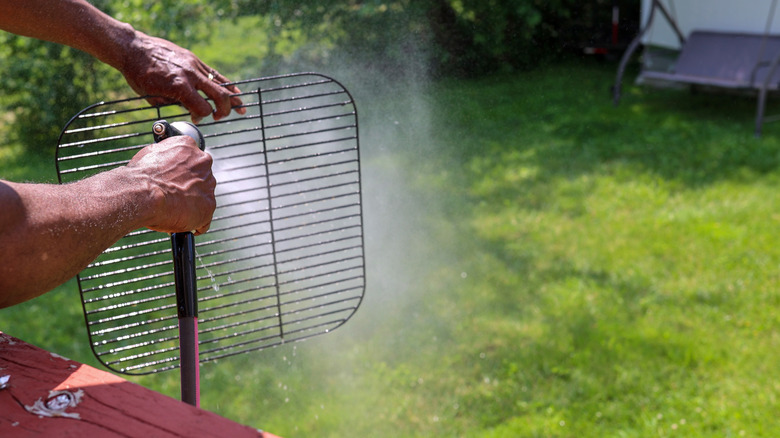10 Crucial Mistakes You're Making While Cleaning Your Grill
We may receive a commission on purchases made from links.
Chances are, you're making some common mistakes while cleaning your grill. Or, perhaps you're like some backyard BBQ enthusiasts who never clean their grills at all, thinking that all the charred grime and old food adds to the taste of the meals they prepare — a bit like a cast iron pan. But that's a myth. Instead, if you don't keep your grill clean, your food can end up tasting like ... a dirty grill. However, there is still a right and a wrong way to clean. If you clean a grill the wrong way, at best, it can damage your equipment. On the extreme end, it can lead to you or someone you cooked for in the emergency room with burns or even a bit of one of your cleaning tools lodged in their throat!
Catastrophes aside, to make sure you have the best summer grilling season, there are a few essentials to keep in mind. These tips, gathered from grilling and cleaning professionals, will keep your guests safe, your food delicious, and your appliance in tip-top shape. Grills can be a big financial investment, so you want to make sure to avoid making these mistakes to keep everything working as it should.
Not cleaning it often enough
The most common grill cleaning mistake is simply not cleaning it often enough. So, how often should you clean your grill to keep it functioning like new? "The good rule of thumb is for every five to seven cooks, clean your grill," Kevin Kolman, head grill master for Weber, told Martha Stewart. This could be a simple clean, like scrubbing down the grates to be sure there aren't any charred food bits left behind or attending to signs of rust or damage. Then, once a year, do a big clean. The big clean is way more intensive. It involves things like taking the grates off the grill to scrub, cleaning out the drip tray, and even removing residue from the outside of the grill with an AIDEA Microfiber Cleaning Cloth.
Experts recommend that the timing of this big clean coincide with the end of the summer season. If you live somewhere that you can't enjoy the patio year-round, freshen things up before you store the grill away so it's ready to go the following year. "Grease hardens as it ages, becoming almost wax-like, so cleaning the thing now will be easier than in the spring," grill expert Tim Heffernan told The New York Times. "It also means you won't begin the next season with a filthy, possibly rancid grill to deal with, because as your grill sits unused, food bits and grease left on the grill will go bad and possibly attract vermin." One or two hours of hard work around Labor Day will ensure your next Memorial Day goes off without a hitch.
Using a wire brush to clean it
Using a wire brush to clean your grill is very common. However, it is also very dangerous, and you should discontinue its use immediately. This is because the small wire bristles can (and do!) break off due to vigorous cleaning. They then can get lodged in your food, which can lead to serious internal injuries if ingested. The worst part is that, often, they are so small and so embedded in the soft tissue of your mouth or throat that the problem can be difficult to diagnose or treat. A 2016 study by the American Academy of Otolaryngology — Head and Neck Surgery found that these bristles accounted for 1,698 visits to the emergency room from 2002 to 2014, and that's just the ones that were recorded. It is possible others slipped through the cracks.
To save yourself from a medical emergency and keep your grill safe and clean, switch to using other tools instead. Avoid wire at all costs and look for options that have synthetic bristles or other materials that can aggravate grime. Try something like this bristle-free Scrub Daddy Grill Brush or the MEKER Grill Brush. These brushes can remove burned-on grime just as well, but without posing a risk for injury.
Using aggressive scourers on enameled grills
If your grill is enameled, avoid using any material that is rough (like a scouring pad), since it will easily ruin the enamel. Other things to avoid are wire bristle brushes, steel wool, and metal scrapers. Even the Scrub Daddy might be too rough for these, as it has tough parts that might leave scratches and other damage behind.
Instead, if you have one of these grills, the bristle-free GRILLART Grill Brush is a great option, as its soft exterior won't scratch the enameled surface while cleaning. Instead, it uses the power of steam to remove the debris and residue. Depending on how dirty your grill is, you may need plenty of elbow grease to remove build-up, but just like with a kitchen sponge and some baked-on food, it will come off eventually. No matter what option you choose, you should also avoid heavy chemicals on enameled grills. Instead, reach for warm, soapy water made with dishwashing liquid, like the Dawn EZ-Squeeze Ultra Dish Soap, for the best results.
Forgetting to wear protective clothing
Wearing the right clothing is essential to your safety when cleaning your grill. Many might think it's a casual task that doesn't require any protection, but this is a crucial mistake to avoid. For starters, you should invest in a good pair of grill gloves. "I also like to use grill gloves when preheating and cleaning to protect myself against high heat," Jason Pruitt, a grill master and training manager at the Weber Grill Academy, told CNN. He recommends the Weber Premium Gloves, which come in a few different sizes, making them accessible for most. Getting the right size is important, as gloves that are too big might get in your way while working or just fall off — rendering them useless.
Aside from gloves to keep your hands safe from the heat of the grill or from any sharp corners or rusted bits, you should also consider wearing closed-toe shoes. While the most advanced might conquer the task in flip-flops, having as much skin as possible covered up when you're working with grease and chemicals is always a good idea. If you think any of the smoke might bother you, you can also don a pair of protective eyewear, like the DEWALT Safety Goggles.
Cleaning the grill when it's too hot
Knowing the right time to clean your grill is essential. Be sure to wait until it's cooled down enough so you don't hurt yourself. Of course, most have enough common sense not to begin wiping down a blazing surface immediately after removing dinner. However, it is relatively common for people to heat up the grill to "burn off" some of the hardened grease and crud. While this will soften the debris, there is a huge risk of burning yourself or igniting flammable cleaning materials. It's a real hidden fire hazard you need to know about.
Scrubbing while the grill is still burning, even with gloves on, can be dangerous. Instead, you have to time things just right. After turning off the grill, wait a few minutes. You can then hold your hand a few inches over the plate to test the temperature. If it feels warm but doesn't hurt your palm, it is generally safe to proceed with caution. If the radiating heat causes discomfort, wait a few more minutes before you begin to scrub, just to be on the safe side.
Mixing cleaning chemicals without realizing it
There are many different ways to clean a grill, depending on what materials you have on hand. For example, you can use vinegar and baking soda in a 2:1 ratio, which will create a fizzing reaction that helps dislodge some of the big chunks of grime. Another DIY option is creating a paste from baking soda and dish soap, which you can let sit on the grates for about 30 minutes before scrubbing. You can even buy a grill degreaser from the store. Yet, layering a degreaser on top of a DIY-soap-job should be the end of your chemical-mixing experiments. Remember that combining any ammonia-based cleaners with bleach forms toxic chloramine gas or hydrogen sulfide. It is incredibly dangerous, even in outdoor settings with lots of ventilation. Because of this, it's best not to use any of these cleaners on the grill at all, especially since many gentler options will also do the trick.
In addition, it's important to not that using things like a harsh oven cleaners or even aluminum foil to scrub off residue can also potentially void your manufacturer's warranty, especially if they explicitly advise against it. Therefore, if you're considering straying from classic dish soap or other gentler cleaners, it's best to stick with grill-specific options like this Weber Grill Grate Cleaner.
Neglecting the firebox and grill box
When you give your grill a thorough cleaning, it's a mistake not to also take the time to clean out the firebox and grill box. The firebox is where the fuel burns to create heat for cooking. The grill box is the main part of the grill, just under the grates. You'll know it's time to clean the grill box when things start to get really smoky when you cook. This means there is too much grease inside of it. If you burn wood or charcoal, the firebox should also be cleaned out before you put the appliance away for the season.
To clean the grill box, the first thing you need to do is take the grates off. Next, you can use wet paper towels to wipe out the bottom. Before using any cleaner, you should try to get as much of the big debris out as you can. If something's really stuck, try something like the G.CATACC 4-Pack Pan Scraper to get it gone. Then, you can wash the inside with warm water and a little dish soap to remove any of the leftover mess. Finish things off by rinsing it off with the hose or a few pitchers of water. Lastly, thoroughly dry it so it doesn't rust. If you don't want to dry it off manually, some prefer to just turn it on for a little bit and let the heat do the rest — but only do this once you know it's been thoroughly rinsed.
Not burning off food residue after each use
It's a mistake not to burn off food residue after each time you use your grill. By not doing this, you are just making more work for yourself later on. It's an easy enough task to add to your grilling routine. When you're finished making dinner, turn the grill up as high as it will go and close the lid to let things cook. You can leave it be for about 10 to 15 minutes, though it's best to still keep an eye on it. If there is any chicken, corn on the cob, or other food stuck to the grates, this high heat should char it enough that it simply burns up and falls into the grill box.
After 15 minutes or so, turn off your grill and let it cool down all the way. From there, you can use your bristle-free cleaning tool of choice to rub off any straggling ash and wipe out the grill box right then or leave it for a big clean later. When you are done, it's a good idea to coat the grates with a high-heat cooking oil, like Happy Belly Canola Oil, as it helps prevent future food particles from sticking.
Ignoring the drip tray/grease pan
Overflowing grease pans are a fire hazard! Forgetting to clean these out is a major mistake, as the fats and grease that build up in these pans are highly flammable. Not only that, but these pans can attract pests to your yard, like rodents or raccoons looking for food. If not pests, your own pet can get into the pan, and if they ingest too much of it, it can make them very sick. They can even get pancreatitis! Because of this, keep the pan clean, and keep an eye on your pets around your BBQ.
To clean the grease pan, start by scraping out any solidified grease into the trash with a spoon or fork. Next, wash the pan with warm water and a mild dish soap. You can use a regular kitchen sponge to get rid of grease that might be a bit more stubborn. Once it is clean and dry, consider adding a disposable aluminum liner. It's an easy way of preventing a greasy grill – just toss the liner when it's full, and the tray underneath stays clean.
Using pressured water indiscriminately
Giving your grill a good rinse with the garden hose is typically fine, as long as you dry the appliance off after. It's a quick way to remove dirt and any cleaner used during the chore. However, if you want to use something more powerful, consider swapping out the hose nozzle for a more concentrated spray — something like the RESTMO Garden Hose Nozzle. Don't use something as intense as a pressure washer, unless you are highly trained and can avoid spraying any of the grill's electronic parts.
For the beginner, using a pressure washer can force water into the grill's ignition components and control panels, damaging them. If you have a higher-tech grill that has any electronic controls, avoid both the water hose and the pressure washer, as these will both ruin them. If you get the forceful stream of water into the burners, it might change how gas flows inside the appliance and potentially even force grease to spray out onto your patio. You can also hurt yourself if you aren't careful operating the hose, as mishaps with a pressure washer can cause soft tissue damage or lead to something getting lodged in your skin.
